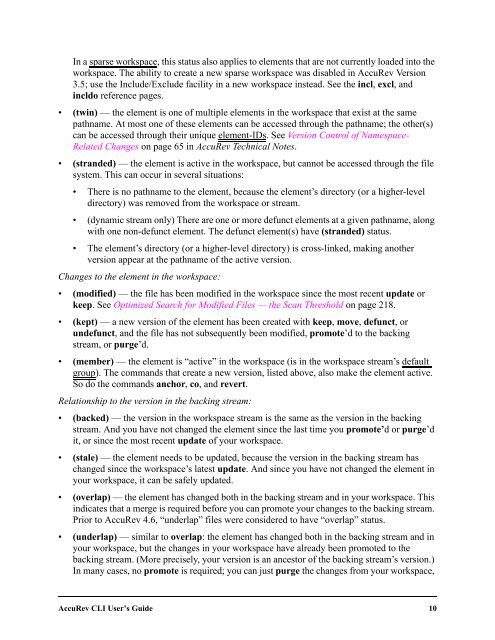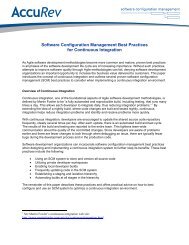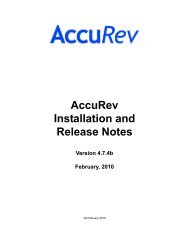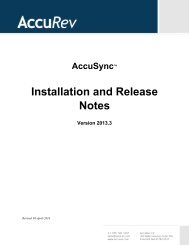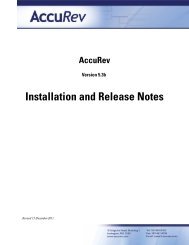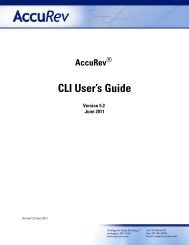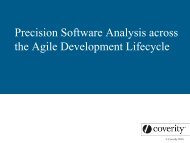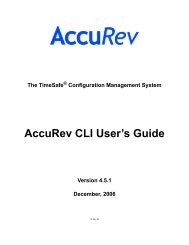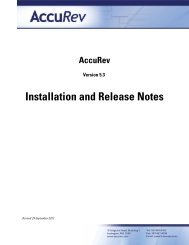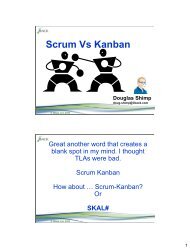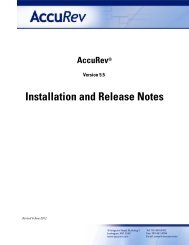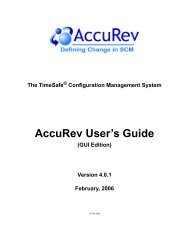You also want an ePaper? Increase the reach of your titles
YUMPU automatically turns print PDFs into web optimized ePapers that Google loves.
In a sparse workspace, this status also applies to elements that are not currently loaded into the<br />
workspace. The ability to create a new sparse workspace was disabled in <strong>AccuRev</strong> Version<br />
3.5; use the Include/Exclude facility in a new workspace instead. See the incl, excl, and<br />
incldo reference pages.<br />
• (twin) — the element is one of multiple elements in the workspace that exist at the same<br />
pathname. At most one of these elements can be accessed through the pathname; the other(s)<br />
can be accessed through their unique element-IDs. See Version Control of Namespace-<br />
Related Changes on page 65 in <strong>AccuRev</strong> Technical Notes.<br />
• (stranded) — the element is active in the workspace, but cannot be accessed through the file<br />
system. This can occur in several situations:<br />
• There is no pathname to the element, because the element’s directory (or a higher-level<br />
directory) was removed from the workspace or stream.<br />
• (dynamic stream only) There are one or more defunct elements at a given pathname, along<br />
with one non-defunct element. The defunct element(s) have (stranded) status.<br />
• The element’s directory (or a higher-level directory) is cross-linked, making another<br />
version appear at the pathname of the active version.<br />
Changes to the element in the workspace:<br />
• (modified) — the file has been modified in the workspace since the most recent update or<br />
keep. See Optimized Search for Modified Files — the Scan Threshold on page 218.<br />
• (kept) — a new version of the element has been created with keep, move, defunct, or<br />
undefunct, and the file has not subsequently been modified, promote’d to the backing<br />
stream, or purge’d.<br />
• (member) — the element is “active” in the workspace (is in the workspace stream’s default<br />
group). The commands that create a new version, listed above, also make the element active.<br />
So do the commands anchor, co, and revert.<br />
Relationship to the version in the backing stream:<br />
• (backed) — the version in the workspace stream is the same as the version in the backing<br />
stream. And you have not changed the element since the last time you promote’d or purge’d<br />
it, or since the most recent update of your workspace.<br />
• (stale) — the element needs to be updated, because the version in the backing stream has<br />
changed since the workspace’s latest update. And since you have not changed the element in<br />
your workspace, it can be safely updated.<br />
• (overlap) — the element has changed both in the backing stream and in your workspace. This<br />
indicates that a merge is required before you can promote your changes to the backing stream.<br />
Prior to <strong>AccuRev</strong> 4.6, “underlap” files were considered to have “overlap” status.<br />
• (underlap) — similar to overlap: the element has changed both in the backing stream and in<br />
your workspace, but the changes in your workspace have already been promoted to the<br />
backing stream. (More precisely, your version is an ancestor of the backing stream’s version.)<br />
In many cases, no promote is required; you can just purge the changes from your workspace,<br />
<strong>AccuRev</strong> <strong>CLI</strong> User’s <strong>Guide</strong> 10


